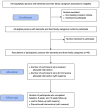This is a preprint.
CEDART Study: protocol for a non-randomized feasibility study
- PMID: 40470215
- PMCID: PMC12136208
- DOI: 10.21203/rs.3.rs-6378596/v1
CEDART Study: protocol for a non-randomized feasibility study
Abstract
Background: Family caregivers of persons with dementia face significant challenges in navigating hospital-to-community transitions. Community health worker-led interventions offer a promising approach to delivering culturally responsive psychosocial support and care navigation. However, there is limited evidence on the feasibility of implementing care transition interventions for this population across healthcare settings. This single-site, single-arm pilot study evaluates the feasibility, acceptability, and preliminary impact of a community health worker-led care transition intervention for caregivers of persons with dementia, Connecting and Empowering Persons living with Dementia and cARegivers during Transition (CEDART).
Methods: Forty hospitalized persons with dementia and their caregivers will receive the CEDART intervention. Eligible patients with confirmed or suspected dementia will be enrolled from a Texas hospital. Respective caregivers will then participate in an initial assessment meeting followed by individualized care planning and follow-up meetings led by the community health worker. The community health worker will continue to provide caregivers with tailored dementia care education, emotional support, and connections to community resources for up to three months post-discharge. Input from a community advisory board of hospital system partners, community-based service providers, and dementia care experts - alongside key informant interviews with hospital providers, community providers, and caregiver participants receiving CEDART intervention, will be used to evaluate the acceptability of the intervention. Key informant interviews will be conducted to assess whether the intervention meets and addresses stakeholder priorities. Participating caregivers will complete baseline, 6-week, and 12-week follow-up interviews to assess caregiver outcomes and intervention feasibility and acceptability.
Conclusions: Study findings will be used to evaluate the feasibility and acceptability of the proposed CEDART care transition intervention for persons with dementia and family caregivers. These results will inform the design of a future definitive randomized control trial.
Trial registration: NCT06831318 (registered and posted on ClinicalTrials.gov).
Keywords: care transition; caregiver; community health worker; non-randomized feasibility study; persons with dementia; psychosocial intervention.
Conflict of interest statement
Competing interests The authors declare that they have no competing interests.
Figures
Similar articles
-
Caring for caregivers and persons living with dementia under home-based primary care: protocol for an interventional clinical trial.Pilot Feasibility Stud. 2024 Feb 9;10(1):28. doi: 10.1186/s40814-024-01455-x. Pilot Feasibility Stud. 2024. PMID: 38336779 Free PMC article.
-
Caregiver- and patient-directed interventions for dementia: an evidence-based analysis.Ont Health Technol Assess Ser. 2008;8(4):1-98. Epub 2008 Oct 1. Ont Health Technol Assess Ser. 2008. PMID: 23074509 Free PMC article.
-
A cluster randomized controlled trial to test the feasibility and preliminary effectiveness of a family dementia caregiver intervention in Vietnam: The REACH VN study protocol.Medicine (Baltimore). 2018 Oct;97(42):e12553. doi: 10.1097/MD.0000000000012553. Medicine (Baltimore). 2018. PMID: 30334942 Free PMC article. Clinical Trial.
-
Comparing Three Ways to Help Cancer Survivors Plan for Follow-Up Care [Internet].Washington (DC): Patient-Centered Outcomes Research Institute (PCORI); 2022 May. Washington (DC): Patient-Centered Outcomes Research Institute (PCORI); 2022 May. PMID: 39666842 Free Books & Documents. Review.
-
Helping Patients with COPD Transition from Hospital to Home—The BREATHE Study [Internet].Washington (DC): Patient-Centered Outcomes Research Institute (PCORI); 2020 Apr. Washington (DC): Patient-Centered Outcomes Research Institute (PCORI); 2020 Apr. PMID: 39680694 Free Books & Documents. Review.
References
Publication types
Associated data
Grants and funding
LinkOut - more resources
Full Text Sources
Medical



